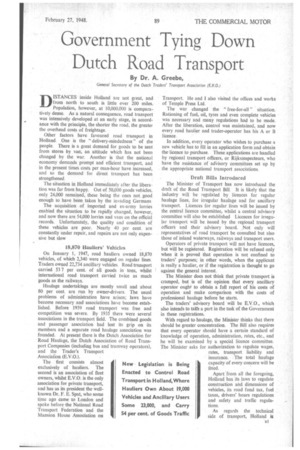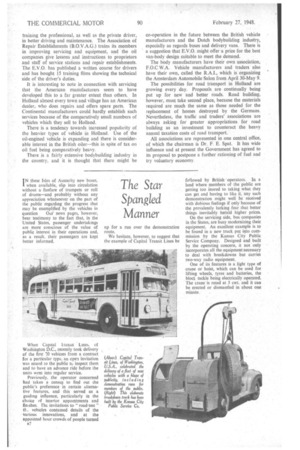Government Tying Down Dutch Road Transport
Page 35

Page 36

If you've noticed an error in this article please click here to report it so we can fix it.
By Dr. A. Greebe,
General Secretary of the Dutch Traders' Transport Association (E.V.O.)
DISTANCES inside Holland are not great, and from north to south is little over 200 miles_ Population, however, at 10,000,000 is comparatively dense. As a natural consequence, road transport was intensively developed at an early stage, in accordance with the principle, the shorter the road, the greater the overhead costs of freightage.
Other factors have favoured road transport in Holland One is the " delivery-mindedness " of the people There is a great demand for goods to be sent from stores by van., an attitude which has not been changed by the war. Another is that the national economy demands prompt and efficient transport, and in the present times costs per man-hour have increased, and so the demand for direct transport has been strengthened.
The situation in Holland immediately after the liberation was far from happy. Out of 50,000 goods vehicles, only 24,000 remained, these being the ones not, good enough to have been taken by the invading Germans The acquisition of imported and ex-army lorries enabled the situation to be rapidly changed, however, and now there are 54,000 lorries and vans on the official records. Unfortunately, the quality and condition of these vehicles are poor. Nearly 40 per cent. are constantly under repair, and repairs are not only expensive but slow 18,870 Hauliers' Vehicles On January 1, 1947, road hauliers owned 18,870 vehicles, of which 2,340 were engaged on regular lines. Traders owned 22,734 ancillary vehicles. Road transport carried 53 7 per cent. of all goods in tons, whilst international road transport carried twice as much goods as the railways.
Haulage undertakings are mostly small and about 80 per cent. are run by owner-drivers. The usual problems of administration have arisen; laws have become necessary and associations have become established. Before 1939 road transport was free and competition was severe. By 1935 there were several associations in the transport field. The combined goods and passenger association had lost its grip on its members and a separate road haulage association was founded. At present there is the Dutch Association for Road Haulage, the Dutch Association of Road Transport Companies (including bus and tramway operators), and the Trader's Transport Association (E.V.0.).
The first consists almost exclusively of hauliers. The second is an association of fleet owners, whilst E.V.O. is the only association for private transport, and has as its president the wellknown Dr. F. E. Spat, who some time ago came to London and spoke before the National Road Transport Federation and the Mansion House Association on Transport. He and I also visited the offices and works of Temple Press Ltd.
The war changed the " free-for-all " situation. Rationing of fuel, oil, tyres and even complete vehicles was necessary and many regulations had to be made. After the liberation, control was maintained, and now every road haulier and trader-operator has his A or B licence.
In addition, every operator who wishes to purchase a new vehicle has to fill in an application form and obtain the licence to purchase. These applications are handled by regional transport officers, or Rijksinspecteurs, who have the assistance of adVisory committees set up by the appropriate national transport associations
Draft Bills Introduced The Minister of Transport has now introduced the draft of the Road Transport Bill It is likely that the industry will be regulated by licences for regular haulage lines, for irregular haulage and for ancillary transport. Licences for regular lines will be issued by the central licence committee, whilst a central advisory committee will also be established Licences for irregular transport will be issued by the regional transport officers and their advisory board. Not only will representatives of road transport be consulted but also those of inland waterways, railways and transport users.
Operators of private transport will not have licences, but will be registered. Registration will be refused only when it is proved that operation is not confined to traders' purposes; in other words, when the applicant is really a haulier, or if the registration is thought to go against the general interest.
The Minister does not think that private transport is cramped, but is of the opinion that every ancillary operator ought to obtain a full report of his costs of operation and make comparison with the costs of professional haulage before he starts.
The traders' advisory board will be E.V.O., which also intends to tare a part in the task of the Government in these registrations.
With regard to haulage, the Minister thinks that there should be greater concentration. The Bill also requires that every operator should have a certain standard of knowledge of operation, administration, rates, etc., and he will be examined by a special licence committee. The Minister asks for authorization to regulate wages, rates, transport liability and insurance. . The total haulage capacity of every concern will be fixed.
Apart from all the foregoing, Holland has its laws to regulate construction and dimensions of vehicles, its road fund tax, fuel taxes, drivers' hours regulations and safety and traffic regulations.
As regards the technical side of transport, Holland is et
training the professional, as well as the private driver, in better driving and maintenance. The Association of Repair Establishments (B.O.V.A.G.) trains its members in improving servicing and equipment, and the oil companies give lessons and instructions to proprietors and staff of service stations and repair establishments. The F.V.O. has published a written course for drivers and has bought 15 training films showing the technical side of the driver's duties.
It is interesting to note in connection with servicing that the American manufacturers seem to have developed this to a far greater extent than others. In Holland almost every town and village has an American dealer, who does repairs and offers spare parts. The Continental manufacturers could hardly establish such services because of the comparatively small numbers of vehicles which they sell to Holland.
There is a tendency towards increased popularity of the heavier types of vehicle in Holland. Use of the oil-engined vehicle is expanding and there is considerable interest in the British oiler—this in spite of tax on oil fuel being comparatively heavy. , There is a fairly extensive bodybuilding industry in the country, and it is thought that there might be
co-operation in the future between the British vehicle manufacturers and the Dutch bodybuilding industry, especially as regards buses and delivery vans. There is a suggestion that E.V.O. might offer a prize for the best van-body design suitable to meet the demand.
The body manufacturers have their own association, F.O.0 W.A. Vehicle manufacturers and traders also have their own, called the R.A.I., which is organizing the Amsterdam Automobile Salon from April 30-May 9.
The possibilities for road transport in Holland are growing every day. Proposals, are continually being put up for new and better roads. Road building, however, must take second place, because the materials required are much the same as those needed for the replacement of homes destroyed by the Germans. Nevertheless, the traffic and traders' associations are always asking for greater appropriations for road building as an investment to counteract the heavy annual taxation costs of road transport.
All associations are represented in one central office, of which the chairman is Dr. F. E. Spat. It has wide influence and at present the Government has agreed to its proposal to postpone a further rationing of fuel and try voluntary economy.




















































































